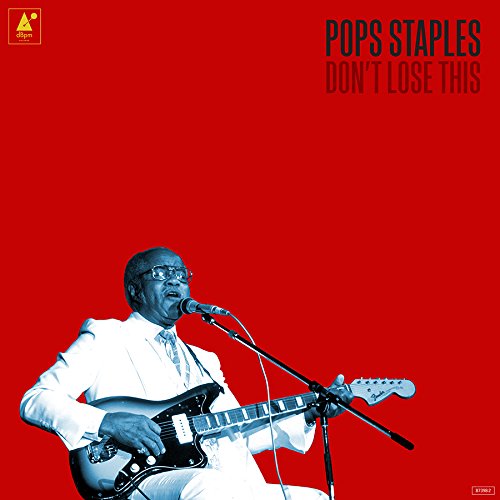
Roebuck "Pops" Staples
Don't Lose This
Release Date: Feb 17, 2015
Genre(s): Gospel, Pop/Rock, Religious, Blues Gospel, Southern Gospel, Country Soul
Record label: dBpm
Music Critic Score
How the Music Critic Score works
Buy Don't Lose This from Amazon
Album Review: Don't Lose This by Roebuck "Pops" Staples
Excellent, Based on 8 Critics
Based on rating 4/5
This deep set by the great R&B-gospel mediator Roebuck "Pops" Staples is a rare example of a posthumous reclamation that feels stronger than the original might've been. Working with unfinished 1999 tracks (originally intended for a lost Staple Singers album), producer Jeff Tweedy isolated voices and Pops' quicksilver guitar — like his singing here, an object lesson in tender power — using minimal additions. The result is bracing, timeless gospel blues, sung with his daughters (the soldier's eulogy "The Lady's Letter") and solo (a chilling read of Blind Willie Johnson's "Nobody's Fault but Mine").
Based on rating 4/5
“Don’t lose this, here,” were the simple words Roebuck “Pops” Staples, musician and patriarchal Staples Singers band leader, said to his daughter Mavis, not long before he died in 2000. He was talking about this collection of his final 10 recordings, made in 1998 and kept under wraps by Mavis for more than a decade. Revamped by Wilco’s Jeff Tweedy – who produced the album and played bass and guitar on several tracks – Don’t Lose This serves as an elegant and delicately crafted homage to Pops’ legacy in blues.
Based on rating 8/10
Pops Staples put his own inimitable stamp on the blues, although he himself rejected the blues label and called his music gospel. His belief in God takes center stage, but his is a loving lord. Pops acknowledges the problems of poverty, addiction, sin, and such. After more than 80 years on the planet as a black man from the South, Pops knew right from wrong even when he was on the losing end.
Based on rating 4/5
Just before he died 15 years ago, Pops Staples, the patriarch of America’s greatest gospel-blues group, said three words to his famous daughter Mavis: “Don’t lose this.” He was referring to the last tapes he recorded. Luckily, she heeded him. While Pops didn’t live long enough to finish the songs, Mavis eventually turned them over to her recent producer, Jeff Tweedy of Wilco.
Based on rating 4/5
Band leader, guitarist and vocal group patriarch Roebuck “Pops” Staples died in 2000, leaving a number of recent unfinished recordings and an instruction to daughter Mavis: “Don’t lose this album.” It has taken more than a decade for her to let it go. Co-produced by Wilco’s Jeff Tweedy, here are 10 spare and uncluttered blues, traditionals and covers featuring Tweedy on bass, his son Spencer on drums and Staples’ daughters high in the mix. Some songs roll along with almost indecent ease – Somebody Was Watching, No News Is Good News – while some draw you up, like the Pops/Mavis duet Sweet Home.
Based on rating 7.9/10
It’s impossible to discuss the Staple Singers’ 1965 live album Freedom Highway without considering what was going down in America that year. On March 7, more than 600 marchers set out to make the 50-mile walk from Selma to Montgomery, Alabama, and were attacked by Alabama state troopers and armed posses. Two days later, they tried again, but turned back when Governor George Wallace denied them state protection.
Based on rating 7/10
Don't Lose This is another positive result -- a gift, really -- from the creative partnership of Mavis Staples and Jeff Tweedy, an alliance that previously brought the Grammy-winning You Are Not Alone (2010) and One True Vine (2013). Prior to his December 2000 death, Pops Staples was in the process of making his fourth solo album. While enjoying a listen to its unfinished recordings, he said, as recalled by Mavis in a promotional clip, "Don't lose that, don't lose it." Over a decade later, Mavis -- with co-production, guitar, and bass from Tweedy, and drums from Tweedy's son Spencer -- fulfilled her promise.
Opinion: Excellent
George Ezra, a young English folk-rocker with fingerpicking, foot-stamping tunes and an unexpectedly grizzled baritone, pulls a Dr. Jekyll-to-Mr.-Hyde personality transformation in the sequence of his debut album, “Wanted on Voyage” (Columbia). He starts out offering all sorts of affection and reassurance, promising to trade riches for love in “Budapest” and begging “Please don’t leave!” in “Cassy O’,” and trying to convince an unhappy woman that “When I hold you I won’t let you go” in “Listen to the Man.” But it’s not long before a different side surfaces: jealous, bitter, pugilistic, vengeful and — in the album’s most bluesy moan of a song, “Did You Hear the Rain?” — openly possessed by Lucifer.
'Don't Lose This'
is available now

